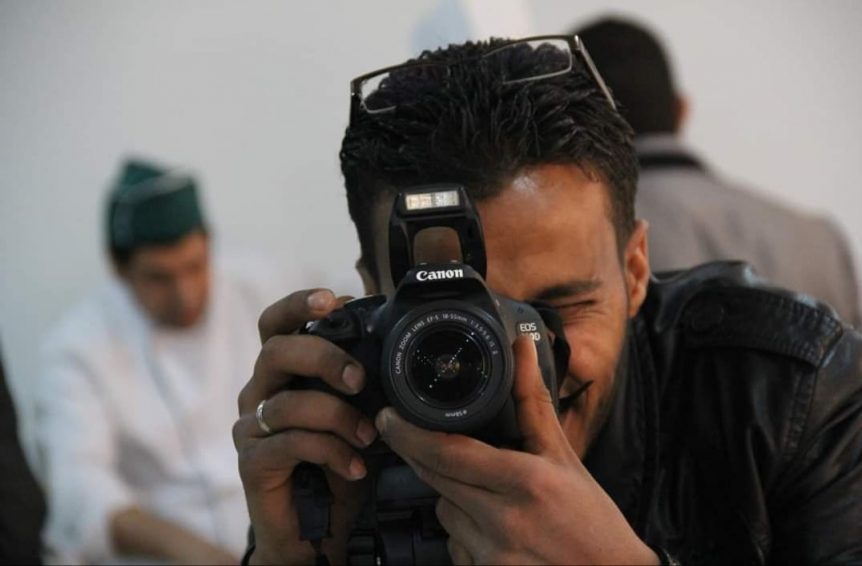Counterterrorism legislation must not be used to silence dissenting voices
The sentencing of photojournalist and activist Ismail Bouzriba Al-Zoui to 15 years in prison by a military court in Benghazi in May 2020 is strongly condemned by the undersigned human rights organizations. His relatives and lawyer only learnt of his sentencing less than a week ago. The undersigned also reject the accusations of supporting terrorism and terrorist groups, and of communication with media outlets identified as supporting terrorism by the General Command of the eastern-based Libyan National Army (LNA) coalition, levelled against him after authorities searched his phone and found content critical of the General Command and the Dignity military operation.
Ismail Al-Zoui was arrested in December 2018 by internal security services of the city of Ajdabiya and has been arbitrarily detained since then – for 20 months – in a military prison in Benghazi. The photojournalist was prevented from contacting his relatives and lawyer, he was not presented to the prosecution with his lawyer in attendance during the entire period of his pre-trial detention. Furthermore, he was not informed of the date of his sentencing hearing and his trial was held in absentia. The violations of due process make a mockery of the trial and indicate the verdict against him was decided in advance.
Ismail Al-Zoui started working as a journalist and activist during the February 17, 2011 uprising. He is currently the chairman of the Libyan Club for Culture and Dialogue, and has published several journalistic reports on Ajdabiya’s media channel in addition to his private channel on YouTube.
Ismail Al-Zoui’s arbitrary arrest and detention, during which he was unable to contact his family and lawyer, and resulting in his recent unjust sentencing, indicates several serious violations of the right to a fair trial safeguarded under Article 14 of the International Covenant on Civil and Political Rights (ICCPR), and General Comment No. 13 of the Human Rights Committee, notably with regards to the establishment of a military court or other special judicial bodies, in addition to violating articles 7 and 26 of the African Charter on Human and Peoples’ Rights.
The undersigned consequently condemn the exploitation of counter terrorism to silence dissenting voices, and confiscate public rights and freedoms guaranteed by the Libyan Constitutional Declaration and international human rights conventions ratified by Libya. They call on the eastern-based executive authorities to immediately release photojournalist Ismail Al-Zoui, as he neither participated in nor incited violence, nor did he bear arms; he only exercised his right to expression. They urge Libyan authorities and their institutions to implement standards guaranteed by the International Covenant on Civil and Political Rights (ICCPR) and the African Charter on Human and Peoples’ Rights ratified by the Libyan state, and in accordance, call on legislative authorities to repeal prison sentences for crimes related to publications, used to silence critics and opposition figures, to review and revise the penal code in accordance with international human rights standards, and to amend the jurisdiction of military courts by canceling its jurisdiction over civilians.
Signatory organizations
- Libya Platform
- Cairo Institute for Human Rights Studies
- The Libyan Center for Freedom of the Press
- Libyan Organisation for Independent Media
- Aswat Media Network
- Libyan Institute for Investigative Journalism
Legal context:
The current Law on Combatting Terrorism [3/2014] contains vague provisions used to arrest any individual for exercising their rights to free speech, assembly and association, or for any ordinary criminal or minor offense. It puts numerous restrictions on freedom of expression, including online censorship. The Law employs an overly broad definition of the terrorist act, which includes harming the environment and prohibiting or obstructing the operation of public authorities, government departments, or municipal units. The law’s expansive definition of terrorism puts peaceful political opposition and independent voices, including human rights defenders and others neither linked to nor supportive of terrorist groups, at risk of prolonged imprisonment for exercising their right to free expression. It allows for people demonstrating in front of government facilities or staging a strike to be charged as terrorists, thereby constituting a direct threat to freedom of expression and peaceful assembly. Article 15 provides for a sentence of five–ten years in prison for “any person who engages in advocacy, propagation, or deception to commit a terrorist act, whether in word, writing, or any other means of broadcast, publication, letters, online activity.”[1]
Moreover, since the adoption of law [4/2017] on amending some Provisions of the Military Penal Code and Military Code of Criminal Procedure by the House of Representatives, terrorism crimes are tried under military court jurisdiction which does not guarantee adequate defence rights and due process, notably in a situation of war and state of emergency.[2]
Additionally, Libyan authorities have continued to target HRDs, journalists and any critics by enforcing laws issued prior to 2015, most of which curtail freedom of expression. Law 76/1972 on Publications, for instance, erects numerous obstacles to freedom of the press. Articles 178, 195, 205, 208, 245, 438, and 439 of the Penal Code continue to be enforced as well. All these articles use overly broad terms— “infringe,” “insult,” “impugn”—that can be interpreted to fully suppress free expression. For example, expressing an opinion about the revolution, criticizing a state authority, or criticizing the Libyan people’s engagement with certain issues can all be interpreted as insulting and are subject to custodial sentences.
[1] See the statement from Human Rights Watch (HRW), “Libya: Amend Counterterrorism Law” (13 May 2015). Accessible here.
[2] See the report from the International Commission of Jurists (ICJ), “Accountability for Serious Crimes under International Law in Libya: An Assessment of the Criminal Justice System”, p. 91, (December 2019). Accessible here.
Share this Post

